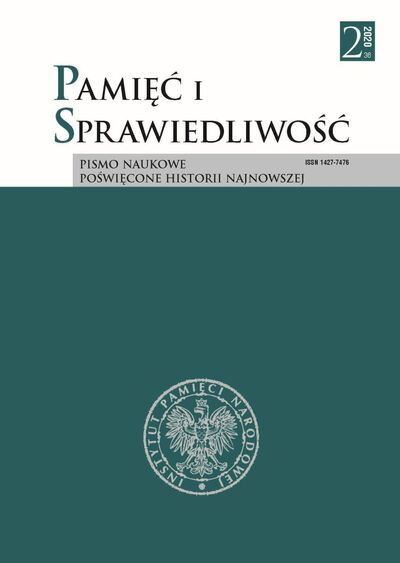Before the TUN Scandal First Broke. General Stanisław Tatar, the Committee of Three, the ‘Drawa’ Fund and Operation ‘Birch Tree’, 1944–1947
Remembrance and Justice, Vol. 36 No. 2 (2020), pages: 409-435
Publication date: 2020-12-31
 https://doi.org/10.48261/PIS203622
https://doi.org/10.48261/PIS203622
Abstract
This article is the first part of a study that outlines the contacts and relations between Brigadier-General Stanisław Tatar (Deputy Head of Staff for Domestic Affairs in the Staff of the Commander-in-Chief of the Polish Army in the West) and his self-appointed “Committee of Three” (General Tatar, Colonel Stanisław Nowicki and Lieutenant Colonel Marian Utnik) on the one hand, and the intelligence services of People’s Poland on the other. Tatar and his collaborators led the 6th Department (Special) of the Commander-in-Chief ’s Staff, whose primary task involved supporting the Underground forces in occupied Poland. Late in 1944, the three men formed a so-called “Committee of Three” in order to embezzle funds from the 6th Department. The three men used creative accounting and the existing structures of the 6th Department to turn the considerable amount (US$7 million at the time) into a so-called “Drawa” Fund, which they proceeded to smuggle to several European countries (and even to the United States) and hide there. This action, which bore all the characteristics of deliberate embezzlement, set in motion a chain of events in 1944–1947 which is described in this article. A separate problem (though also one that was inseparably linked to Tatar) was the so-called gold treasure of the National Defence Fund, its development also described in the article. The wide basis of the source information available has made it possible to offer an account of the motivations of Tatar and his fellow committee members, their actions and their consequences (inasmuch as possible within the constraints of an academic publication). The article ends with a description of the handover of the gold treasure to the Warsaw regime as part of Operation “Brzoza” (Birch Tree) and the proposed gradual handover of the “Drawa” Fund. Part two of the publication will focus on that latter operation, which took place in 1947–1949, and on the conflicts between the members of the committee and their activities as agents of the Communist military intelligence (Nowicki and Utnik), ending with their arrest.
References
Archiwum Instytutu Pamięci Narodowej
Centralne Archiwum Wojskowe Wojskowego Biura Historycznego
Instytut Polski i Muzeum im. gen. Sikorskiego w Londynie
Studium Polski Podziemnej w Londynie
Akcja terrorystyczna kierowana jest z zagranicy z terenów Anglii i Ameryki (wywiad z Min. Bezp. Publ., ob. Radkiewiczem), „Gazeta Polska (Niepodległość). Dziennik Wychodźstwa Polskiego we Francji”, 16 II 1946, nr 36 (140).
Kuropieska J., Z powrotem w służbie, Warszawa 1984.
Leder S. i W., Czerwona nić. Ze wspomnień i prac rodziny Lederów, Warszawa 2005.
Protokół otwarcia kas zawierających dokumenty pozostałe po Bolesławie Bierucie i dokumenty przekazane przez Jakuba Bermana, „Krytyka. Kwartalnik Polityczny” 1981, nr 8.
Siemaszko Z.S., Korespondencja z Jerzym Giedroyciem (1959–2000), Lublin 2008.
Sprawozdanie Komisji Specjalnej Rady Narodowej R.P. z dotychczasowego wyniku jej prac, „Zeszyty Historyczne” (Paryż) 1972, z. 22.
Stanisław Mikołajczyk w dokumentach aparatu bezpieczeństwa, t. 1: Działalność w latach 1945–1947, wstęp J. Gmitruk, wybór i oprac. W. Bagieński i in., Warszawa 2010.
Bagieński W., Wacław Komar – przyczynek do biografii (lata 1909–1945), „Komunizm: system – ludzie – dokumentacja” 2018, nr 7.
Buczek R., Rozgrywka o dolary, Kielce 1991.
Buczek R., Stanisław Mikołajczyk, t. 2, Toronto 1996.
Cenckiewicz S., Długie ramię Moskwy. Wywiad wojskowy Polski Ludowej 1943–1991, Poznań 2011.
Friszke A., Poksiński J., Pomiędzy Londynem a Warszawą. Rozmowa z Marianem Utnikiem, „Zeszyty Historyczne” (Paryż) 1994, z. 108.
Gieleciński M., Wojenne i powojenne losy Funduszu Obrony Narodowej, „Biuletyn Wojskowej Służby Archiwalnej” 2000, nr 23.
Jachniak W., Oskarżam…!, Wrocław 1987.
Jędrzejewicz W., Fundusz Obrony Narodowej w czasie 2-ej wojny światowej, „Zeszyty Historyczne” (Paryż) 1962, z. 1
Koreś D., Stanisław Tatar (1896–1980) [w:] Polski Słownik Biograficzny, t. 52/3, z. 215, Kraków 2019.
Kunert K.A, Słownik biograficzny konspiracji warszawskiej 1939–1944, t. 1, Warszawa 1987.
Mitkiewicz L., Placówka „Star”, „Zeszyty Historyczne” (Paryż) 1970, z. 17.
Paczkowski A., Razem czy osobno: próba „organicznego połączenia” wywiadów Polski Ludowej w latach 1947–1950, „Dzieje Najnowsze” 2015, nr 4.
Pobóg-Malinowski W., Najnowsza historia polityczna Polski 1864–1945, t. 3: Okres 1939–1945, Warszawa 2000.
Poksiński J., „TUN”. Tatar – Utnik – Nowicki. Represje wobec oficerów Wojska Polskiego w latach 1949–1956, Warszawa 1992.
Siemaszko Z.S., Działalność generała Tatara 1943–1949, Lublin 2004.
Sierpowski S., Meandry „sprawy” generała Stanisława Tatara, „Dzieje Nowożytne” 2000, t. 9 (10).
Szlaszyński J., Pułkownik dyplomowany Edward Maliszewski, „Zeszyty Naukowe Muzeum Wojska” 2013, nr 26.
Wiśniewski A., Pilnowałem skarbu, „Stolica”, 26 IV 1981, nr 17 (1740).
License
Copyright (c) 2023 Pamięć i Sprawiedliwość

This work is licensed under a Creative Commons Attribution-NonCommercial-NoDerivatives 4.0 International License.
 Język Polski
Język Polski
 English
English
 Deutsch
Deutsch
 Français (France)
Français (France)
 Italiano
Italiano
 Русский
Русский



 PDF (Język Polski)
PDF (Język Polski)




